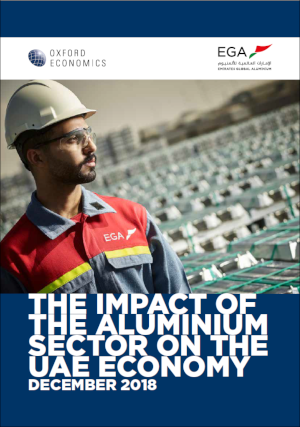Ungated Post | 19 Dec 2018
The impact of the aluminium sector on the UAE economy

Production of aluminium and of semi-finished aluminium products supports just over 60,000 jobs in the UAE, once supply chain linkages and employee spending impacts are taken into account. This is associated with a US $5.47 billion contribution to UAE GDP.
The UAE’s aluminium sector, which comprises the major primary aluminium producer Emirates Global Aluminium (EGA), and its domestic business customers who make semi-finished aluminium products, contributed US $2.42 billion to UAE GDP in 2017. The sector’s high labour productivity, by global and local standards, meant that this required only 10,110 directly-employed workers. However, taking supply chain linkages (‘indirect impacts’), and staff spending effects (‘induced impacts’) into account, in total the sector supported 60,950 UAE-based jobs across the manufacturfing, construction, energy and utilities, and services sectors. That is equivalent to 1.0 percent of all UAE jobs, and means that for every job in the aluminium sector itself, a further five roles are supported elsewhere in the national economy. The total contribution to national GDP associated with that was US $5.47 billion, or 1.8 percent of total non-oil GDP.
Our economic consulting team are world leaders in quantitative economic analysis, working with clients around the globe and across sectors to build models, forecast markets and evaluate interventions using state-of-the art techniques. Lead consultants on this project were:
Oxford Economics’ team is expert at applying advanced economic tools that provide valuable insights into today’s most pressing business, financial and policy issues.
To find out more about our capabilities, contact:
EMEA
Sam Moore
+44 (0)207 803 1415
Email
Americas
Hamilton Galloway
+1 (646) 503 3068
Email
Asia
Christie Tang
+852 3974 8841
Email
Related Services

Post
The economic impact of abandoning the WTO
Oxford Economics have been commissioned by the International Chamber of Commerce (ICC) to provide an independent assessment of the economic impact of WTO dissolution. This report details our findings and the assumptions underpinning our analysis.
Find Out More
Post
The economic impact of the sports activities of public service media
This study shows how the sports activities of public service media supported €4.5 billion of GDP and 57,000 jobs across 31 European countries in 2022. The report also highlights wider economic benefits of public service media sports coverage, such as the way in which it leverages sponsorship income for sports bodies.
Find Out More
Post
Global Trade Education: The role of private philanthropy
Global trade can amplify economic development and poverty alleviation. Capable leaders are required to put in place enabling conditions for trade, but currently these skills are underprovided in developing countries. For philanthropists, investing in trade leadership talent through graduate-level scholarships is an opportunity to make meaningful contributions that can multiply and sustain global economic development.
Find Out More